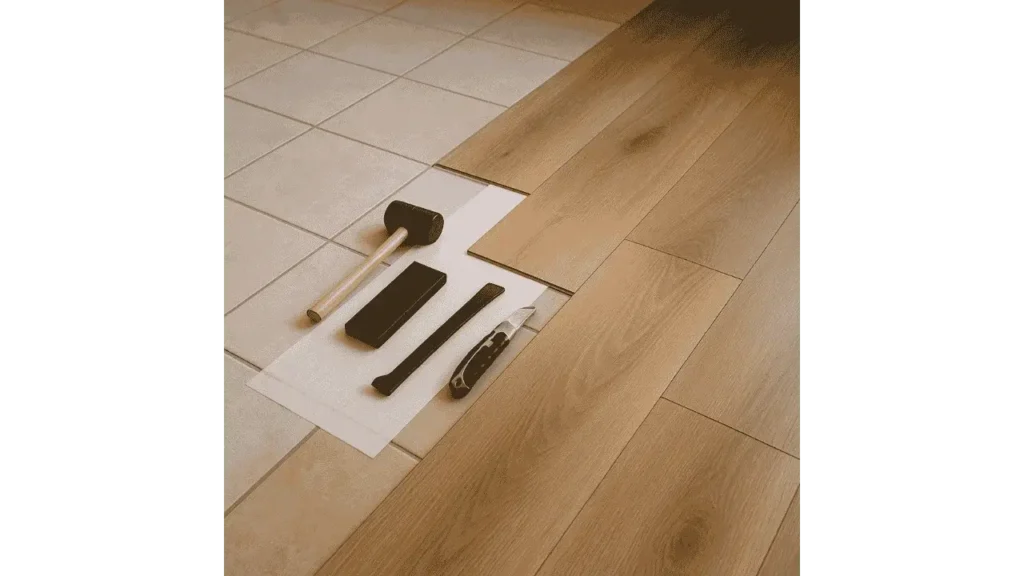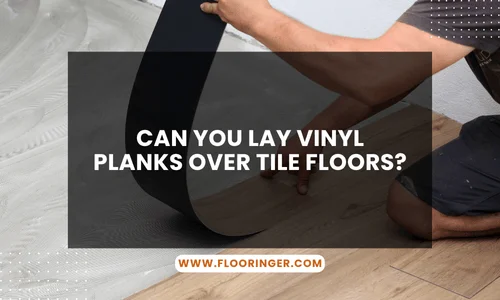A few years back, I helped a homeowner transform their outdated tiled kitchen floor without tearing up a single tile, and we did it using vinyl planks. It’s a method I still recommend when the existing floor is structurally sound. Vinyl plank flooring offers a quick, mess-free upgrade that saves both time and labor. If your tile surface is level and in good shape, laying vinyl over it can completely change the look and feel of the room without the stress of demolition.

Can You Lay Vinyl Over Existing Flooring?
Yes, vinyl plank flooring can be installed over existing tile flooring, but certain conditions must be met for a successful installation. The tile floor must be in good condition, with no loose or broken tiles. The surface should be level, as uneven tiles or grout lines can create an unstable foundation for the vinyl planks. In cases where grout lines are too deep, applying a leveling compound can help create a smooth surface.
“Grout lines can show through thinner vinyl unless you prep the surface properly with a leveling compound,” warns Angela West, product specialist at VinylTech Industries.
Is LVP Waterproof?
Luxury Vinyl Plank (LVP) flooring is waterproof, making it an excellent option for areas such as kitchens, bathrooms, and basements. When installed over tile, LVP provides an additional moisture-resistant layer, protecting the subfloor from spills and humidity. Proper sealing of the edges and seams ensures enhanced waterproofing and prevents water infiltration.
Preparing the Tile Floor for Vinyl Installation
Proper preparation is crucial when installing vinyl planks over tile. Start by thoroughly cleaning the tile surface to remove any dirt, grease, or debris that may hinder adhesion. Inspect the tiles for cracks or loose pieces and repair them accordingly. If grout lines are deep, using a self-leveling compound helps create a flat and even surface for the vinyl planks to adhere to.
What Vinyl Can We Use Over the Tile?
Choosing the right type of vinyl plank flooring is essential for a successful installation over tile. Rigid core vinyl planks, such as Stone Plastic Composite (SPC) or Wood Plastic Composite (WPC), are preferred due to their stability and ability to conceal minor imperfections in the tile. These planks are designed with a rigid core that prevents the telegraphing of grout lines, ensuring a smooth and flawless appearance.
“Installing rigid core vinyl planks over tile is a great solution as long as the surface is even and structurally sound,” says Jake Morrison, a certified flooring contractor with FloorPro Solutions.
Learn More: How to Glue Down Your Vinyl Plank Flooring?
Installation Methods for Vinyl Over Tile
There are several installation methods for laying vinyl planks over tile, including the click-lock and glue-down methods. Click-lock vinyl planks are an excellent option for a floating floor installation, as they interlock without adhesive, allowing for expansion and contraction. The glue-down method provides a more permanent solution, ensuring strong adhesion to the tile surface.
Potential Challenges and Solutions
While installing vinyl planks over tile offers many benefits, there are potential challenges to consider. Uneven tile surfaces can lead to an uneven finish, which can be resolved with proper leveling. Additionally, height differences between rooms may require the use of transition strips to create a smooth connection between flooring types.
Final Takeaways
Laying vinyl plank flooring over tile is a practical and stylish way to refresh your space without removing existing flooring. With proper preparation, the right choice of vinyl, and careful installation, you can achieve a durable and aesthetically pleasing result that enhances your home’s overall appeal.
